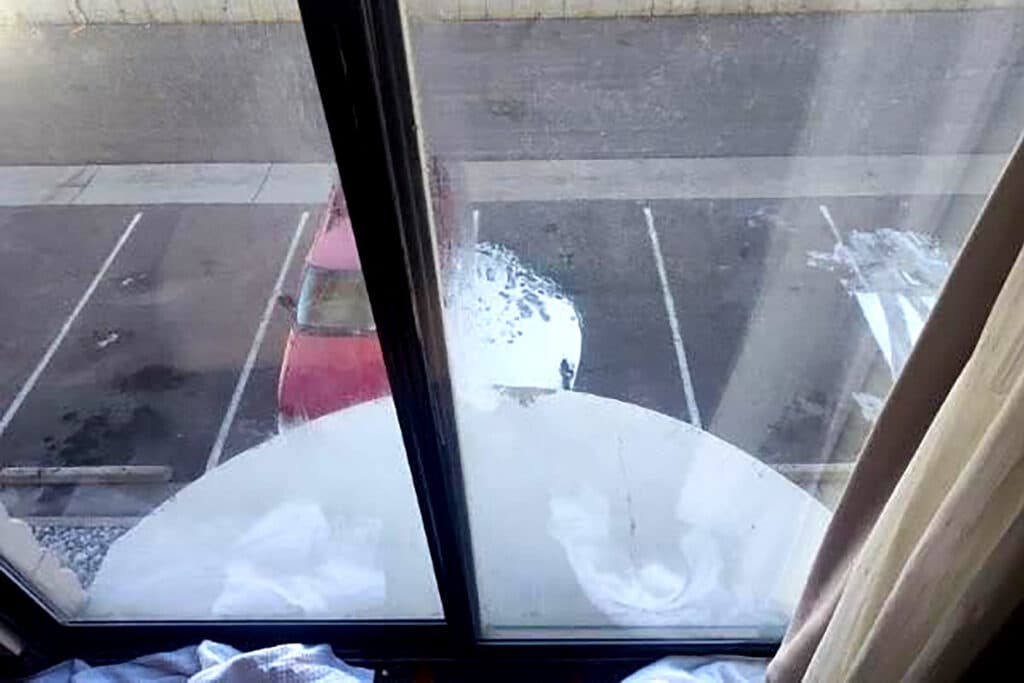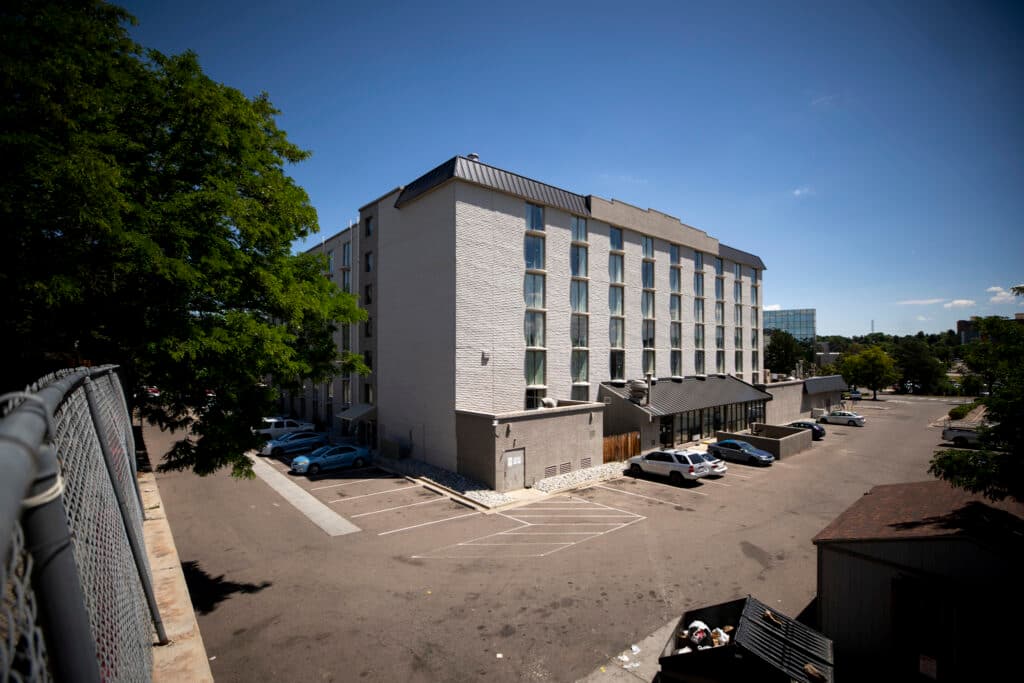An 11-year-old girl fell five stories from a sliding glass door on Monday, suffering serious injuries, at the Tamarac Family Shelter in Denver.
The Salvation Army said the girl would soon be released from the hospital. But the incident raised serious questions about safety at the shelter: Why did the door open into a ledge with no barrier? And why was it unlocked?
City officials say they are racing now to secure the glass doors in each room at the shelter for homeless families, but an attorney says he and shelter guests have raised concerns since last year.
Why the door was unlocked and unsafe:
The shelter, run by the Salvation Army, is a former Embassy Suites hotel. The previous owners removed the balcony railings before the city bought the building, though it’s unclear why.
When the city bought the building for about $21 million, it sealed the locks and put notices on every door in English and Spanish, warning residents not to open the door or tamper with the bolts.
But that wasn’t enough to keep the girl in Monday’s incident safe.
"We had some folks who broke off the locks on those systems and opened the doors even against our guidance," Mayor Mike Johnston said at a meeting this week. "The child that fell out, that was a room where they had broken off the lock that we had put in."
The locks securing the doors could be removed with standard Phillips-head screwdrivers.

The facility hosts 204 families and is part of Denver Mayor Mike Johnston's House1000 initiative. Each room has a similar glass door and balcony-turned-ledge. The girl fell from the seventh floor onto a lower roof. It’s not clear how or when the door was unlocked. Her name and the details of her injuries have not been made public.
A Salvation Army spokesperson said that when families move in, they sign an agreement not to tamper with the sealed doors.
“Unfortunately, the safety features were tampered with—contrary to The Salvation Army’s regulations and the signed guest agreement—and the door was opened. The Salvation Army takes the safety of every family in our care extremely seriously,” a spokesperson wrote to Denverite. “Our staff frequently check these window safeguards. We remain committed to maintaining safe and supportive shelter for families in need and to working closely with our city partners to prevent future incidents.”
The city’s permanent solution is to secure the doors with rivets, allowing it to open 4 inches for ventilation but no further. that allows for four inches of ventilation. The locks also would use tamper-proof bolts.
“We obviously saw why we don’t want them opened,” Johnston said in the meeting.
This change was already in motion after a maintenance request from June, city officials said, but it’s been expedited after Monday’s incidents. The 4-inch openings were suggested by the Denver Department of Public Health and Environment to allow for proper ventilation. City officials say each room also has a personal air conditioning unit.
Past concerns with the Tamarac facility, the housing program and with Salvation Army
In 2024, attorney Darren O’Connor wrote a letter to the Salvation Army with concerns about this specific facility, especially the sliding glass doors.
O’Connor represented a family living at Tamarac who said they had mold in their room due to a leak from the sliding glass door. The family had a three-year-old and was concerned that their door would not fully close and was not properly sealed.
A spokesperson for the Salvation Army did not respond to questions about the letter, but said the charity’s staff completes routine checks of the rooms, which includes the doors.

An audit released in 2024 found that “poor management” within the Department of Housing Stability, or HOST, has led to security concerns at shelters generally, among other issues.
“Housing Stability’s poor organization is negatively affecting operations at Denver’s shelters,” O’Brien said in a statement. “These issues need to be addressed because vulnerable populations are at risk.”
Denver’s auditor, Tim O'Brien, found people died at one shelter that had failed to meet its security-related contract requirements, prompting promises from the city and its partners to improve safety at the shelter network.
More recently, advocates pushed lawmakers to cut ties with The Salvation Army, arguing the organization was ill-equipped to run shelters. That led some council members to warn that they wanted to see significant changes at the charity’s shelters.
The Salvation Army spokesperson Jennifer Forker argued, “individuals with personal grievances” have spread “false claims and misinformation” about the organization.
Despite this, she wrote in a statement: “Every day, The Salvation Army shelters up to 1,800 people, including at least 300 children — work no one else stepped up to do — and we do it with professionalism and care. We remain steadfast: with open hands, compassionate hearts, and a deep sense of purpose.”
During the Tuesday city council meeting, Johnston praised the council for their efforts in the housing initiative and urged Denverites tuning in to focus on the progress made, saying the result has been a 45 percent reduction in street homelessness.
Denverites Kyle Harris contributed to this reporting












